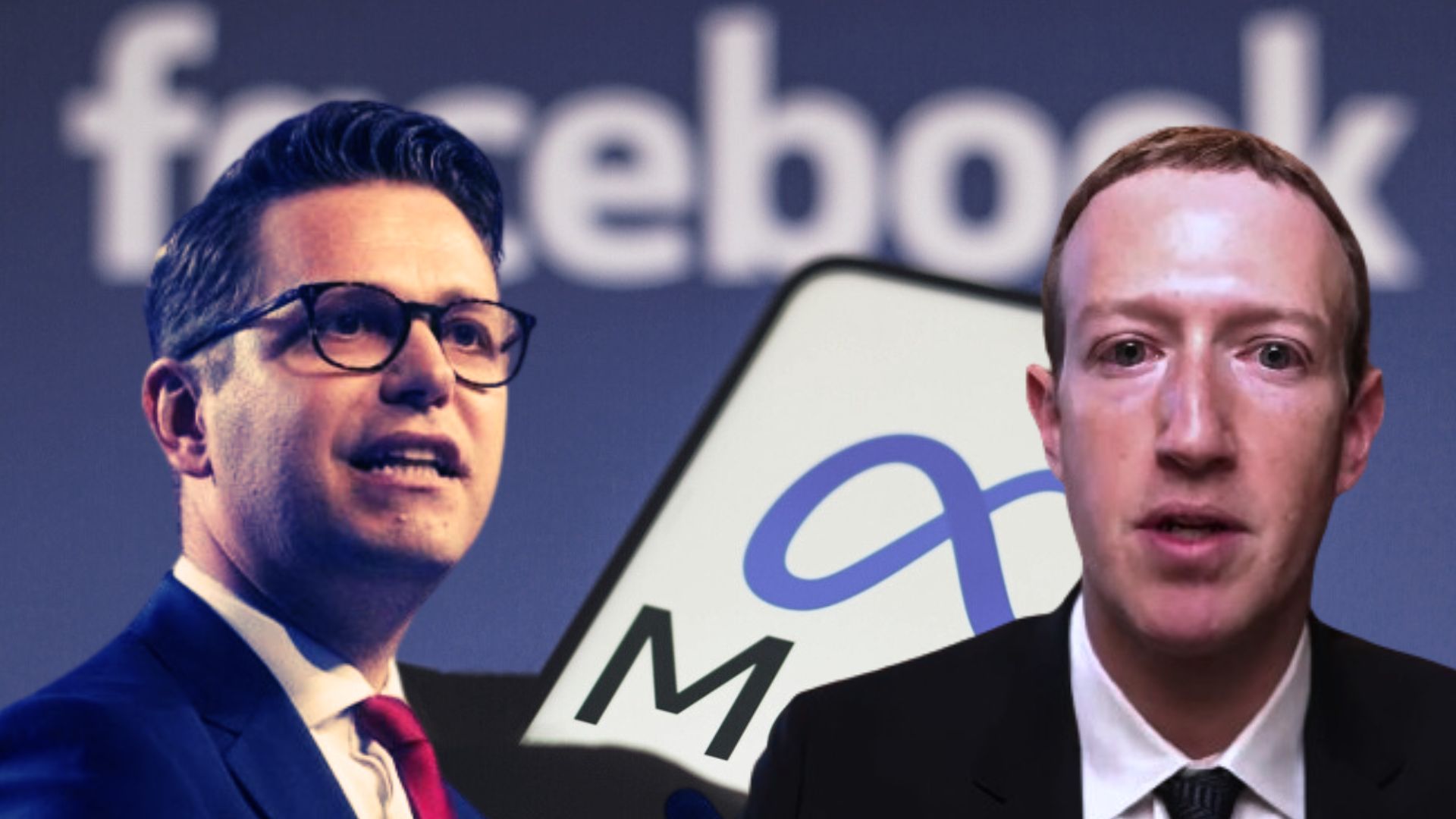Many are unaware that one of the most important free-speech court cases in Europe is taking place in Belgium and being led by Vlaams Belang MEP Tom Vandendriessche, who is fresh off another victory in EU elections. Remix News had previously reported Meta’s censorship of Vandendriessche and his legal win against Meta, noting it was being described as a “victory against Big Tech,” but now Vandendriessche tells Remix News that the case may not be over yet.
He shared some remarkable aspects of the trial, including the enormous costs and resources tied to taking on a Big Tech Goliath like Meta, how a potential appeal could still develop in the future, and the enormous stakes for free speech and democracy tied to this case.
Your victory against Meta has become a major free-speech news story. What got you started on this journey challenging Meta in court?
My Facebook page is one of the largest political pages in Flanders (region in Belgium), so it is now at 235,000 followers. And I think it was in 2021, I posted during the Black Lives Matter riots, which were going on in the United States, and also here in Brussels some statues were torn down. So, I posted a message on Facebook with a photo of a Nazi book burning. And I wrote, “First they come after the statues, then after the books, then after the people. This must stop. This is intolerance.”
And so I denounced the violence in the streets and made a reference to what happened in the horrible Nazi era. This is a 100 percent legal opinion on my part. Six months later, in 2021 — it was after the U.S. elections — suddenly I got a sanction from Facebook. And they said that I was spreading a hateful message with this message from six months before. Of course, this was completely ridiculous. But then they banned me for one year from posting anything on Facebook, so from my personal account.
Luckily there were other people who still had access to my business account, so they could post on my behalf, on my Facebook page. But me personally, I was banned for one year. What happened? They limited my reach to my followers. So, I had an average of 150,000 I reached. So, people were reached with every message, on average, before this happened.
During the sanctions, it was limited to 6,000 people and after the sanctions, it rose to about 12,000 people. So, as we speak at this moment, I still am not able to reach out to my voters because Facebook is deliberately limiting my reach and this is what we call shadow banning.
What the judge said is that they applied a shadow ban on my account during this year when they sanctioned me — and a shadow ban is not a formalized sanction they use in their terms of agreement. So, what I needed to do, I needed to spend money on Facebook ads to reach my own followers. So, Meta needs to repay this amount of money I paid, about €30,000. So this is where we are now.
The main question is, is shadow banning legal? Because we have data from my Facebook page from thousands of messages where we can have, for example, a monthly average. And we see clearly that it goes from 150,000 on average reach before the sanctions to 6,000 during the sanctions. And after they so-called lifted the sanctions, I still only reach on average 12,000 people. So in my opinion, the shadow banning is still in force, is still applied.
An in-depth report for Remix News from @Olivier_Bault on how @RSF_inter is seeking to censor right-wing opinion and news outlets in its home country of France. https://t.co/5e4BC5xdIQ
— Remix News & Views (@RMXnews) February 29, 2024
We asked Meta to provide data on this, data on other politicians because they say that Meta has applied different policies now where political Facebook pages are limited in reach by definition. But on this topic, the European Commission has started an investigation against Facebook in April because the European Commission considers this illegal.
They consider the specific act against your page illegal, or is this something that’s affecting all political pages?
The EU is now focusing on Meta as a company. So when Meta adjusted their policy and they say it applies to every politician or every political page on Facebook where they have deliberately limited reach, thereby shadow banning these pages. And this is, according to the European Union, illegal, so they are now investigating this. I went to court for this, and the court said that the data I could provide did not give sufficient evidence because I could not compare the reach with other Facebook pages. But Facebook refused to give this information from other Facebook pages.
Is there any way to sort of coerce them into providing this data?
Yes, there is. This is what we ask the judge in the appeals court, but the judge did not order this from Meta. They could have done this. So, at this moment, we are looking into this question if we are going to appeal this verdict or not, because it’s quite clear. The judge says, “All of the data you have is for your page,” but I cannot provide data from the same period for other pages. I did so for recent months from Facebook pages from colleagues here in the European Parliament in Denmark or in Estonia or in Germany or in France.
And this all points out that their pages are not shadow banned, because their average reach is about 35 to 45 percent of their followers. So, if they have 10,000 followers, like say, they reach on average 3,500 to 4,500 people — exactly what my reach was before these sanctions began. But just since the data you provide from other pages does not apply to the same time frame, from 2021 to 2024, there is not enough evidence and they did not order Meta to provide this, but we requested this. So, now we are looking into with our lawyers if we are going to appeal this verdict for this reason.
And what would keep you from appealing? Why are you even considering not appealing?
Well, there’s also the fact that we had a victory in this case. If you appeal, then everything is back on the table. So, now Facebook was ordered to repay a certain amount of the advertising fees I paid. The judge thought they had illegal sanctions imposed on me. So, these are numerous victories we had in the high court, in the appeal court. But if we appeal again, then the whole case goes back to the drawing board. So, this is where we are now at the moment.
Are these not two separate issues? One issue is whether it was improper that you were sanctioned in the first place for this post. And the second question is, are you still sanctioned by Facebook? Is there not a potential for you to file a new claim regarding current sanctions from Facebook?
Yeah, but this is what we are now also looking at regarding what the European Union is doing with their investigation. They started in April of this year recently. They are looking into if Facebook is shadow banning all of the political pages because they consider it an illegal action. So, this could also solve my problem.
And I want to stress what the major problem behind this is. In Flanders, research has proven that 70 percent of all young new voters get their information from social media regarding elections. For 50 percent of all of the voters, their primary information source is social media. Meta is a company that has basically a quasi-monopoly on social media. Of course, there is Twitter, of course there are other platforms, but Meta has a market position where it dominates, I think 80 percent of all Belgian voters have a Facebook account, for example. There is no comparison.
So, if we allow Facebook to manipulate who can send a message in our democracy, not only by sending it, but also by who receives it — this is what is even more important — then we basically allow Facebook to manipulate information flows, which can have an effect on the electoral results, and we just simply cannot allow this.
For example, in this election, so my Facebook page had a reach of 2,000, 3,000 and so on, but I have 235,000 followers where people deliberately follow my page to receive messages, you see? So this is really problematic for democracy. And this surpasses me as a person or my party or Belgium as a democracy. This is basically a problem that every country in the world faces.
And you basically received your money back, but that seems like a rather small legal victory in some sense.
Of course. it’s not about the money for me, obviously. It’s about not being able to reach out to voters. This is what is important to me.
But why did the judge not actually penalize Meta? More or less, they just rewarded you your legal fees back, but this sum is nothing to Meta in terms of a financial penalty.
Of course. Now, if the shadow ban was proven — but the judge said I lack enough data to consider it proven — then Meta needed to pay €2 million to me. But €2 million is for Meta also not a very important sum. I also got €1 “moral compensation.”
And we don’t have a tradition here in Belgium, like in the United States, where these kinds of companies need to pay huge amounts of money. And this is a problem, I think, because this court case has cost us several hundred thousands of euros in legal fees.
So your legal fees actually have not been compensated?
No, no, no, no, absolutely not. Awards for legal fees here in Belgium amount to something like €5,000, I got back, or something like that.
So, the hundreds of thousands in legal fees the case has already cost you is a real reason to not appeal.
Yeah, but that’s not a reason. I have the backing of my party to do this legal procedure…
Perhaps money is not a factor in terms of your moral imperative to pursue this case, but parties and people need to also take these things into consideration when they’re talking about resources. So even if you win, it doesn’t necessarily mean that you’ll be compensated monetarily for this case.
That is correct. So this means that no citizen who gets shadow banned or gets censored has the money to do this kind of effort to sue Facebook or to sue Meta rather, and they don’t get compensated if they do. So, Meta is home free basically, and I must repeat, we simply cannot allow this in our democracy.
Remix News was also very popular on Meta about a year and a half ago. We had 100 million views in a single year. And we faced a number of sanctions and so on and we’re basically at this point shadow banned. We don’t have any reach more or less anymore, and we don’t have the resources to pursue a legal case. You say that the European Commission is investigating this issue. Do you really think that they are going to take this matter seriously and force Meta to open up to a free open debate on social media when at the same time they’re using this EU Digital Services Act potentially to censor alternative media? We recently interviewed MEP Gerolf Annemans from your party, and he said your party needs a plan B and eventually, due to the Digital Services Act, conservatives will be kicked off of social media.
Yeah. Already commissioner (Thierry) Breton threatened this openly with Twitter (X) for not applying so-called hate speech censorship. And what they mean with hate speech is basically counter-speech. They don’t want their policies to be criticized on social media, they don’t want the people or the opposition to reach out to citizens.
It’s basically the same trick as when the printing of books was invented and then the Church intervened on its own behalf. It’s always the same logic. Those in power, they want to remain in power and they are afraid of voices being heard and of free debate.
I think I don’t have a lot of confidence in the European Union to tackle this problem. But on the other hand, as I said, this surpasses me, my party, my country. It is a fundamental problem. Are we going to allow companies to manipulate the information flows is one question, and the second is are we going to allow governments to put pressure on companies to censor citizens or politicians? So, it’s two questions, but it’s the same logic behind them. There’s no focus on the freedoms which are elementary to a democracy.
Your party performed quite well in the EU elections. But beforehand, there was a lot of turmoil in the ID faction regarding the AfD being expelled. What is your position on the AfD’s expulsion? Many German conservatives view it as a betrayal. But obviously there is a lot of politics behind this with the French, as the French were the main ones against the AfD in this instance. Why did your party go along with this expulsion?
Well, Vlaams Belang is always open for business with other parties we consider good parties, and we still have good relationships with the AfD party, so make no mistake about this. And the groups will be formed now on the third of July. We’ll see what happens in the next weeks.
But we also have very good ties with the National Rally now. We have been partners for more than 40 years.
Well, why do you think that Le Pen sort of is waging this campaign against the AfD? I mean, what does she really get out of it?
I don’t think that Marine Le Pen or the National Rally is conducting a campaign against AfD. There have been some troubles within AfD and I think this is a political signal.
So, do you think that the ID will eventually consider allowing the AfD back in? I mean, the AfD expelled Krah from the party, but Le Pen has already rejected the AfD coming back to ID even after this explusion. But do you think that there’s some chance down the road that the fences may be mended there?
We’ll see what happens in the future. As for Vlaams Balang, we have very good relationships with the National Rally and we also have good relationships with the AfD.
You had a good result in the EU elections. What do you think is the next step for your party in the political process?
Well, we’re the largest party for the European election in the whole of Belgium, we are the largest party in half of the local Flemish communities, local communities. So now we have local elections coming up in October. We did not succeed in becoming the largest party in the national election in Flanders. We’re the second, we missed it by 5,000 votes. So, a razor-thin margin. So, we have high hopes for the future. And I think we will break this cordon sanitaire either in local elections in October, or in the next upcoming national elections.






